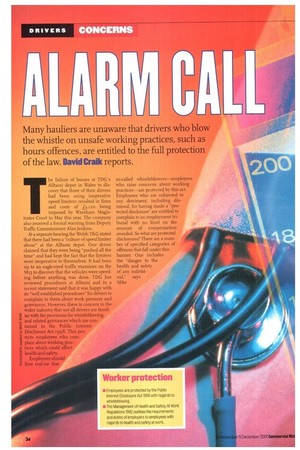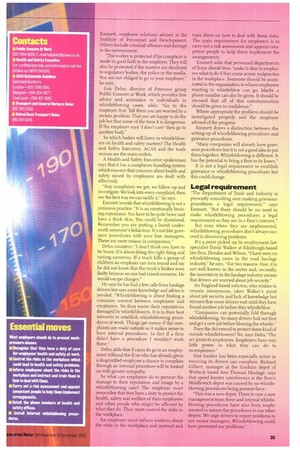Many hauliers are unaware that drivers who blow the whistle on unsafe working practices, such as
Page 34

Page 35

If you've noticed an error in this article please click here to report it so we can fix it.
hours offences, are entitled to the full protection of the law. David Craik reports.
The failure of bosses at TDG's Alltarni depot in Wales to discover that three of their drivers had been using inoperative speed limiters resulted in fines and costs of £3,120 being imposed by Wrexham Magistrates Court in May this year. The company also received a formal warning from Deputy Traffic Commissioner Alan Jenkins.
At a separate hearing the Welsh T&G stated that there had been a "culture of speed limiter abuse" at the Alltami depot. One driver claimed that they were being "pushed all the time" and had kept the fact that the limiters were inoperative to themselves. It had been up to an eagle-eyed traffic examiner on the M53 to discover that the vehicles were speeding before anything was done. TDG has reviewed procedures at Alltami and in a recent statement said that it was happy with its "well established procedures" for drivers to complain to them about work pressure and grievances. However, there is concern in the wider industry that not all drivers are fan iil
.1 iar with the provisions for whistleblowing
f and related grievances which are con
c., -1 tamed in the Public Interest m
„s• Disclosure Act 1998. This pro
1 tects employees who corn _
1 plain about working prac
tices which could affect
1 health and safety.
c
g Employees should i first real-ise that so-called whistleblovvers—employees who raise concerns about working practices—are protected by this act. Employees who are subjected to any detriment, including dismissal, for having made a "protected disclosure" are entitled to complain to an employment tribunal with no limit on the amount of compensation awarded. So what are protected disclosures? There are a number of specified categories of offences that fall under this banner. One includes the "danger to the health and safety of any individual," says Mike Emmett, employee relations adviser at the Institute of Personnel and Development. Others include criminal offences and damage to the environment.
"The worker is protected if his complaint is made in good faith to the employer. They will also be protected if the matters are disclosed to regulatory bodies, the police or the media. You are not obliged to go to your employer," he says.
Guy Dehn, director of Pressure group Public Concern at Work, which provides free advice and assistance to individuals in whistleblowing cases, adds: "Go to the employer first. Tell them you are worried by a certain problem. That you are happy to do the job but that some of the time it is dangerous. If the employer says 'I don't care' then go to another body."
So which bodies will listen to whistleblowers on health and safety matters? The Health and Safety Executive, ACAS and the trade unions are the main outlets.
A Health and Safety Executive spokesman says that it has a complaints handling system which ensures that concerns about health and safety raised by employees are dealt with effectively.
"Any complaints we get, we follow up and investigate. We look into every complaint, then see the best way we can tackle it," he says.
Emmett reveals that whistleblowing is not a common practice. "It is an emotionally bruising experience. You have to be quite brave and have a thick skin. You could be dismissed. Remember you are putting a bomb underneath someone's behaviour. It's not like grievance procedures with your line managers. These are mere moans in comparison."
Dehn counters: '' I don't think you have to be brave. It's about doing the right thing and raising concerns. If a truck kills a group of children an employer can turn round and say he did not know that the truck's brakes were faulty because no one had raised concerns. He would escape charges."
He says he has had a few calls from haulage drivers but says more knowledge and advice is needed. "Whistleblowing is about finding a common interest between employees and employers. No firm wants their reputations damaged by whistleblowers. It is in their best interests to establish whistleblowing procedures at work. Things get messy if the complaints are made outside so it makes sense to have internal procedures. In fact if a firm didn't have a procedure I wouldn't work there."
Dehn adds that if cases do go to an employment tribunal the fim who has already given a disgruntled ernplc re a chance to complain through an internal procedure will be looked on with greater sympathy.
So what can employers do to prevent the damage to their reputation and image by a whistleblowing case? The employer must remember that they have a duty to protect the health, safety and welfare of their employees and other people who might be affected by what they do. They must control the risks in the workplace.
An employer must inform workers about the risks in the workplace and instruct and train them on how to deal with these risks. The main requirement for employers is to carry out a risk assessment and appoint competent people to help them implement the arrangements.
Emmett adds that personnel departments of firms should then "make it clear to employees what to do if they come across malpractice in the workplace. Someone should be nominated in the organisation to whom employees wanting to whistleblow can go. Maybe a phone number can also be given. It should be stressed that all of this communication should be given in confidence."
Where appropriate the problem should be investigated properly and the employee advised of the progress.
Emmett draws a distinction between the setting up of whistleblowing procedures and grievance procedures.
"Many companies will already have grievance procedures but it is not a good idea to put them together. Whistleblowing is different. It has the potential to bring a firm to its knees."
It is not a legal requirement to establish grievance or whistleblowing procedures but this could change.
Legal requirement
"The Department of Trade and Industry is presently consulting over making grievance procedures a legal requirement," says Emmett. "But there should be no need to make whistleblowing procedures a legal requirement as they are in a firm's interest."
But even when they are implemented, whistleblowing procedures don't always succeed in discovering problems.
It's a point picked up by employment law specialist David Walker at Edinburgh-based law firm, Dundas and Wilson. "I have seen no whistleblowing cases in the road haulage industry," he says. "For two reasons. One, it is not well known in the sector and, secondly, the uncertainty in the haulage industry means that drivers are worried about job security."
An England-based solicitor, who wishes to remain anonymous, takes Walker's point about job security and lack of knowledge but stresses that some drivers wait until they have found another job before they whistleblow.
"Companies can potentially fold through whistleblowing. So many drivers bail out first and get a new job before blowing the whistle."
Does the Act extend to protect these kind of outside whistkblowers? No, says Delm."The act protects employees. Employers have very little power in what they can do to ex-employees" One haulier has been especially active in ensuring its drivers can complain. Richard Gilbert, manager at the Guyhirn depot of Wisbech based Ken Thomas Haulage, says that speed limiter interference at the firm's Middlewich depot was caused by no whistleblowing procedures being present there.
"This was a new depot. There is now a new management team there and internal whistleblowing procedures have also been implemented to mirror the procedures in our other depots. We urge drivers to report problems to our senior managers. Whistleblowing could have prevented our problems."
































































































































































